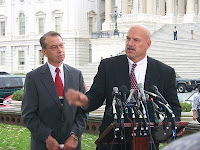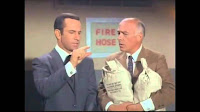“Aimee Thanatogenos spoke the tongue of Los Angeles; the sparse furniture of her mind—the objects which barked the intruder's shins—had been acquired at the local High School and University; she presented herself to the world dressed and scented in obedience to the advertisements; brain and body were scarcely distinguishable from the standard product, but the spirit—ah, the spirit was something apart; it had to be sought afar; not here in the musky orchards of the Hesperides, but in the mountain air of the dawn, in the eagle-haunted passes of Hellas. An umbilical cord of cafés and fruit shops, of ancestral shady businesses (fencing and pimping) united Aimee, all unconscious, to the high places of her race. As she grew up the only language she knew expressed fewer and fewer of her ripening needs; the facts which littered her memory grew less substantial; the figure she saw in the looking-glass seemed less recognizably herself. Aimee withdrew herself into a lofty and hieratic habitation.”—English novelist Evelyn Waugh (1903-1966), The Loved One (1948)
Seventy-five years ago this month, British editor
Cyril Connolly published in his magazine Horizon this “Anglo-American Tragedy”
by Evelyn Waugh. Its appearance in this forum was partly the author’s
favor to Connolly, who was trying to keep the magazine afloat—and partly
Waugh’s effort to sound out how news of his bitingly satiric take on America
would be taken across the Atlantic, where it would be published in book form in
November.
Much like Charles Dickens a century before, Waugh had
not been particularly impressed by what he saw on his trip to the U.S. in 1947.
His natural dyspepsia would have been provoked anyway, over how much the
American film industry misunderstood his novel being considered for adaptation,
Brideshead Revisited.
But he was positively astonished by the funeral
practices he found at Hollywood’s famous Forest Lawn—simultaneously
commercialized and saccharine. It sanitized the grim reality of death and, in
its way, repudiated the need for the spiritual redemption he felt when he
converted to Roman Catholic.
You can sense this even in the passage above. Aimee
Thanatogenos is an airhead who has taken to a “lofty and hieratic habitation,”
scarcely encumbered by “the sparse furniture of her mind.” Indeed, her grasp of
reality—“the facts which littered her memory”—is only growing weaker.
This female character’s name was cunningly constructed
by Waugh. The first name would have struck an immediate chord with L.A.
habitues, who would have heard an echo of the famed revivalist preacher Aimee
Semple McPherson, who had died only four years previously. This fictional Aimee is a vapid evangelist for
“Whispering Glades,” Waugh’s stand-in for Forest Lawn.
But on another level, the character’s first and last
names spoke directly to the novel’s themes. “Aimee” is French for “loved one,”
the American funeral industry’s preferred designation for the deceased. “Thanatogenos”
is Greek for “deathborn,” another nod to this character’s job: cosmetician at
“Whispering Glades.”
Waugh had resisted handing over film rights to Brideshead
Revisited. He undoubtedly wished he had done the same with The Loved One.
He died within days of the London premiere of Tony Richardson’s adaptation of his novella, and it is not believed that he had a chance to view the film.
But he must have known that the product was as mangled
as the bodies that arrived at Whispering Glades. When I saw the 1965 film this
weekend, I couldn’t believe it was by the same director who had brought Tom
Jones to such vivid life two years before. It had added material to its
source and updated it, to no real purpose.
Right from the get-go, Waugh seems to have had
misgivings about the project, especially after learning the first screenwriter
was Christopher Isherwood—not just the kind of British expatriate he had sent
up in his book, but also, with W.H. Auden, a thinly veiled subject of his ire
in Put Out More Flags. (Later, Terry Southern would punch up that draft
with more contemporary material.) To no avail, Waugh had tried to get his name
taken off the credits for the movie.
Moviegoers—as well as those like me, who caught the
film this weekend on TCM—would have been struck by actor Robert Morse, whose
English accent seemed to have slipped somewhere over the Atlantic.
Moreover, inevitably, as will be apparent from the
passage I provided, there was no cinematic equivalent for Waugh’s prose style,
which amply fulfills the ideal he evoked in the 1955 essay “Literary Style in
England and America”:
“The necessary elements of style are lucidity,
elegance, individuality; these three qualities combine to form a preservative
which ensures the nearest approximation to permanence in the fugitive art of
letters.”
(The image accompanying this post shows actress
Anjanette Comer, who played Aimee in the film. For fine insight into Waugh's novella, see Jeffrey Manley's blog post from the Website of the Evelyn Waugh Society.)

















